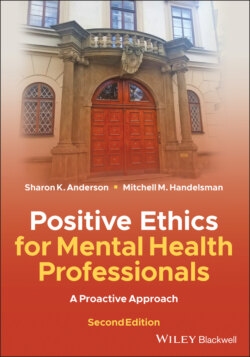Читать книгу Positive Ethics for Mental Health Professionals - Sharon K. Anderson - Страница 10
Some Terminology
ОглавлениеWe want to create a common understanding of some terminology. When people write about morals and ethics in philosophy, mental health, medicine, and other fields, they define the words “moral” and “ethical” in a myriad of ways. Some authors use the two terms synonymously; others give them very specific and different meanings. Both terms refer to judgments of right and wrong behavior and the justifications we make for those judgments. In this book we will use the term “ethics” when we refer to professional behaviors, judgments, and decisions. We will use “personal ethics” when we refer to personal beliefs about right and wrong, and “morals” when we are referring to a wider range of behaviors, judgments, and decisions, including those in personal relationships.
Behaving ethically by following rules to avoid punishment has been termed remedial ethics (Knapp et al., 2017). We are all for avoiding punishment, but behaving ethically is not only a matter of following rules—although your professional career might go better when you do. We believe that professionals are motivated to do good work and actualize their highest moral and ethical selves—coming from their core or essential self. Here we are talking about positive ethics (Handelsman et al., 2009), which is the study of ethics that includes higher levels of motivation and behavior. Focusing on positive themes, the ethical ideal, is more effective, more professionally sustaining, and more fun than focusing only on rules and what we shouldn’t do (Handelsman et al., 2009; Knapp et al., 2017). At the same time, we aren’t talking about perfection. Perfection is way overrated and impossible. We are human and bound to make ethical mistakes and missteps. What we do at times like these is what matters (Welfel, 2016).
We’re going to talk a lot about our professional and ethical identities. We will use the terms synonymously, or put a slash between them, because we believe that ethics is such a big part of our professional identity that there is no real difference between the two. Professional/ethical identities are at the heart of good therapy practice, good supervision, and good relationships with other professionals.
What does professional/ethical identity mean? Researchers and experts offer a variety of ideas. Some see professional/ethical identity as an integration between the person and the professional commitment to ethics (Monson & Hamilton, 2010). Lloyd-Hazlett and Foster (2017) describe it as the amount of integration across the counselor’s “personal and professional ethical commitments” (p. 91). Auxier et al. (2003) see the counselor’s ethical identity as one of combining the personal, which includes values and morals, with the professional, which includes roles and decisions. For us, ethical identity is this view of self as an ethical person. Drawing from Blasi (1984) and his understanding of identity, we understand that ethical identity and professional/ethical identity includes this “organization of self-related information” that holds ethical thinking, behavior/choices, and a sense of integrity (congruence and consistency of who one is) as key or critical to continue to be the person and the professional they are (Anderson, 2015).
Mental health professionals use a variety of terms to describe what they do—the two major terms being psychotherapy and counseling. In the interest of clarity and brevity, we will use the terms counseling, psychotherapy, and therapy interchangeably.
